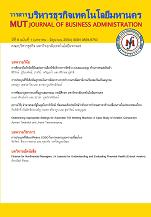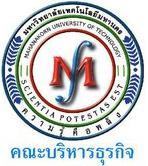(ความไร้) อำนาจของรัฐในยุคโลกาภิวัตน์: ข้อเสนอเชิงประจักษ์ว่าด้วยการกำหนดราคาข้าวเปลือกภายในประเทศของไทย
Keywords:
รัฐ, โลกาภิวัตน์, ราคาข้าวเปลือกภายในประเทศ, ข้อมูลอนุกรมเวลา, State, Globalization, Domestic Paddy Price, Time Series DataAbstract
ภายใต้บริบทของโลกาภิวัตน์ รัฐถูกเปรียบเปรยให้เป็นเพียงบ้านหลังเล็กในหมู่บ้านโลกการถกเถียงเกี่ยวกับอำนาจที่แปรเปลี่ยนไปในสถานการณ์เช่นนี้ แม้จะเกิดขึ้นอย่างกว้างขวางในเชิงคุณภาพ แต่การพิสูจน์ในเชิงปริมาณด้วยข้อมูลประจักษ์ยังคงมีอยู่อย่างจำกัด การวิจัยครั้งนี้จึงเลือกใช้วิธีวิทยาเชิงปริมาณขั้นสูง โดยนำข้อมูลอนุกรมเวลาของราคาข้าวเปลือกภายในประเทศ ต้นทุนการผลิตข้าวภายในประเทศ ราคาข้าวสารในตลาดโลก และราคานโยบายของรัฐบาล มาวิเคราะห์ด้วยการวิเคราะห์ถดถอยพหุผลการวิจัยพบว่า ในขณะที่ต้นทุนการผลิตข้าวภายในประเทศไม่มีอิทธิพลต่อราคาข้าวเปลือกภายในประเทศทั้งที่ระดับนัยสำคัญทางสถิติ .05 และ .01 ราคาข้าวเปลือกภายในประเทศ กลับได้รับอิทธิพลจากราคาข้าวสารในตลาดโลก ซึ่งเป็นตัวแทนของอำนาจโลกาภิวัตน์ มากกว่าราคานโยบายของรัฐบาล ซึ่งเป็นตัวแทนของอำนาจรัฐ ที่ระดับนัยสำคัญทางสถิติ .05 ถึงราว 4.78 เท่า ชี้ให้เห็นว่าอำนาจของรัฐในบริบทเช่นนี้ มิได้อยู่ในสถานะที่จะต่อกรกับอำนาจของกระแสโลกาภิวัตน์ได้อีกต่อไป ข้อเสนอในเชิงนโยบายจึงเกี่ยวพันอยู่กับการปรับเปลี่ยนแนวทางการจัดการทางเศรษฐกิจที่รัฐบาลในปัจจุบันยังคงเลือกที่จะทุ่มงบประมาณจำนวนมหาศาลเพื่อเข้าแทรกแซงราคาข้าวต่อไป
Power (Lessness) of the State in the Globalization Era: Empirical Proposals on Determination of Domestic Paddy Price in Thailand
In the context of globalization, states are insinuated as little homes in the global village. Although arguments on change of powers in the current situation are widely made qualitatively, quantitative analysis by empirical information is still minimal. This study, therefore, chose an advanced quantitative methodology, using time series data on domestic paddy price, domestic cost in rice production, world market price of rice, and the government-determined price according to its policy, in multiple regression analysis.
The research findings show that while the cost of domestic rice production does not influence domestic paddy price, both the statistic significance at the .05 and .01 levels, domestic paddy price is in fact more affected by the world market price of rice, which represents the globalization power, than by the price determined by the government. Such findings are statistically significant at the level of .05 to approximately 4.78 times, indicating that state power in this context is no longer in the position to bargain with the power of globalization. Hence, policy recommendations continues to link with adjustments of economic managements, in which the current Thai government still chooses to utilize great amount of its budget in order to intercept its market price of rice.
Downloads
Issue
Section
License
ข้อความ ข้อคิดเห็น ข้อมูล เนื้อหา รูปภาพ แผนภูมิ แผนผัง เป็นต้น ที่ปรากฏและแสดงในบทความต่างๆ ในวารสารบริหารธุรกิจเทคโนโลยีมหานคร ถือเป็นความรับผิดชอบโดยตรงของผู้เขียนบทความนั้นๆ มิใช่เป็นความรับผิดชอบใดๆ ของวารสารบริหารธุรกิจเทคโนโลยีมหานคร และมหาวิทยาลัยเทคโนโลยีมหานคร
บทความที่ตีพิมพ์ในวารสารบริหารธุรกิจเทคโนโลยีมหานคร ถือเป็นลิขสิทธิ์เฉพาะของคณะบริหารธุรกิจ มหาวิทยาลัยเทคโนโลยีมหานคร หากบุคคลหรือหน่วยงานใดต้องการนำทั้งหมดหรือส่วนใดส่วนหนึ่งไปเผยแพร่ต่อหรือเพื่อกระทำการใดๆ จะต้องได้รับการอนุญาตเป็นลายลักษณ์อักษรจากคณะบริหารธุรกิจ มหาวิทยาลัยเทคโนโลยีมหานครก่อนเท่านั้น


